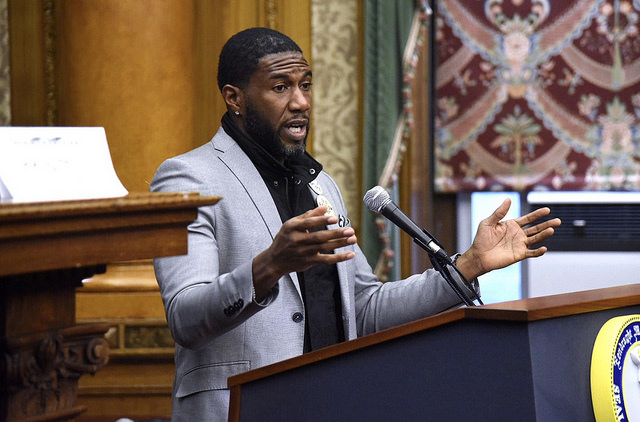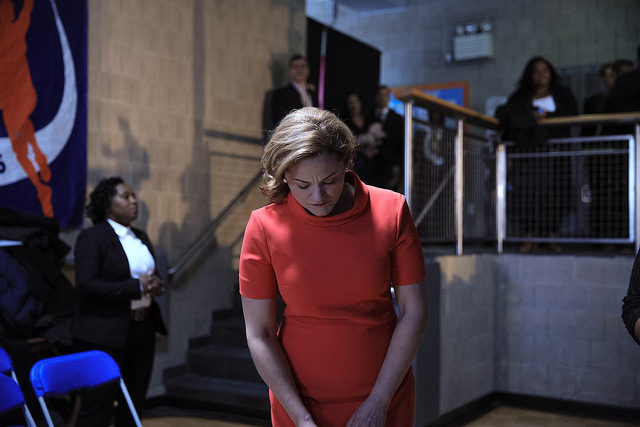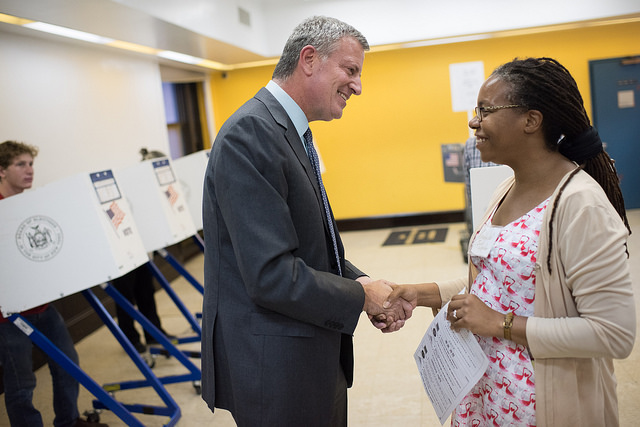Jumaane Williams Elected New York City Public Advocate

Jumaane Williams (photo: John McCarten/City Council)
Jumaane Williams, the outspoken New York City Council member from Brooklyn who touts himself as an “activist elected official,” won the special election for public advocate on Tuesday, emerging victorious by a wider margin than most expected in a field with 17 candidates on the ballot. Only about a half-hour after polls closed at 9 p.m., NY1 television called the race for Williams, who had more than 30% of the vote with more than 50% of election precincts reporting. As of about midnight, Williams had roughly 33%, about one-third of the 402,000 votes reported at that point, with about 98% of precincts reporting results.
There are roughly 5.18 million registered voters in New York City -- turnout appears to be about 8%.
"This campaign may have been relatively short but this journey has been long," Williams said to supporters at his victory party at Cafe Omar in Flatbush, according to prepared remarks. "It traces back across years of working with all of you on the front lines of the issues that matter to all of us, of fighting for transformational change in the streets and in the halls of government."
Williams will serve the next ten months as one of three citywide elected officials, along with the mayor and comptroller, and will have to defend his seat in a potential June primary and the November general in order to serve the remainder of the term, which runs through 2021. Letitia James vacated the position after becoming the state attorney general, triggering the special election. The field featured several other current and former elected officals, such as City Council Member Eric Ulrich, the lone Republican elected official in the field and likely second-place finished, and former City Council Speaker Melissa Mark-Viverito, who appears likely to come in third.
Ulrich was in at about 19% of the vote, with Mark-Viverito at about 11 percent. Assemblymember Michael Blake was in fourth at about 8%, City Council Member Ydanis Rodriguez at 6%, and attorney Dawn Smalls at 4%. Other candidates included City Council Member Rafael Espinal and Assemblymembers Ron Kim and Danny O'Donnell, activists Nomiki Konst and Ben Yee, among others.
Williams was the presumed frontrunner from the start of the race -- though he rejected that status -- having secured 669,068 votes in an unsuccessful primary bid for lieutenant governor last year, 434,393 of which came from New York City alone. Williams retained momentum from that race and seemed to only add to the endorsements from advocacy groups, political clubs, and elected officials across the city.
Williams touted his credentials as a tenant organizer, activist, and legislator. He has repeatedly boasted of “putting my body on the line” as he did last year when he blocked an ambulance carrying immigration activist Ravi Ragbir, who was arrested at a routine check-in with federal immigration authorities. Williams’ actions led to his arrest and a subsequent trial in which he was found guilty on one misdemeanor charge but not on others. He was sentenced to time served in police custody.
Williams has been both ally and antagonist to Mayor Bill de Blasio, himself a former public advocate. Williams has praised the mayor on improvements at the NYPD and on criminal justice reforms more broadly, but he has been critical that much-needed reform on police discipline and transparency has stalled. He has also focused on housing issues, saying that the mayor's approach to affordable housing is not aggressive enough. In his speech Tuesday, Williams issued a warning to the mayor, and others in power in the city and state. "I know that there are some who have sought to get rid of [the public advocate's office] and now, I'm sure there are powerful people who want it gone even more," he said. "But we aren't going anywhere. Instead, we're going to hold the powerful accountable. The mayor, the police commissioner, the governor, the big money interests. We are watching, and we will speak out."
As the public advocate, Williams becomes one of three citywide elected officials besides the mayor and comptroller. The public advocate serves as the city’s ombudsperson, with a prominent bully pulpit and the ability to introduce legislation before the City Council. But the office itself holds few other powers and has a budget of only about $3.5 million -- the special election itself cost about $15 million in public funds.
Still, former public advocates have gone on to bigger things, as James’ election showed. Her predecessor for two terms in the office was de Blasio. Williams has said he will not run for mayor in 2021. Though he may consider that pledge, most pressingly he needs to hold onto his newfound power later this year.
[This story has been and will be updated]
***
by Samar Khurshid, senior reporter, Gotham Gazette
@samarkhurshid @GothamGazette
Ben Max contributed to this story.
Unsuccessful in Public Advocate Bid, Mark-Viverito Faces Uncertain Political Future

Melissa Mark-Viverito (photo: William Alatriste/New York City Council)
Former Speaker of the New York City Council Melissa Mark-Viverito lost her bid for public advocate in the special election held Tuesday, as Brooklyn City Council Member Jumaane Williams came out on top of a crowded field of candidates to claim victory by an unexpectedly wide margin. Mark-Viverito came in third behind WIlliams and City Council Member Eric Ulrich, the lone Republican elected official in the field of 17 candidates. It was the first-ever nonpartisan citywide special election in New York City, decided by an expectedly low turnout of voters.
With about 87.5 percent of ballot scanners reported, Mark-Viverito had received about 11% or 39,730 votes, while Williams had just over 33% with 118,979 votes. Ulrich was in between the two at about 19%.
At her election night party at the London Irish Pub in East Harlem, part of the district she represented for three terms in the City Council, Mark-Viverito claimed credit for influencing the issues in the public advocate campaign, while acknowledging she had come up short. “[I]n this campaign, we helped change this city in so many important ways,” she said, touting her push for improving the MTA, her advocacy for residents of public housing, her call for taking ICE out of the state’s courts, and spotlighting the lack of diversity in city leadership.
On that last point, she seemed most disappointed. “I don’t see myself as a woman reflected in this city right now, and that is troubling,” she said, noting that the three other offices with citywide responsibilities are currently held by white men (Speaker Corey Johnson is the acting public advocate until Williams is sworn in), including Mayor Bill de Blasio and Comptroller Scott Stringer.
Mark-Viverito encouraged young women to run for elected office, an effort she herself has supported through the 21 in 21 campaign to elect 21 women to the City Council in the 2021 municipal elections.
Mark-Viverito could attempt another shot at the public advocate’s seat in the coming months. Under the City Charter, the winner of the special election must defend the seat this year, first in a party primary in June if a challenger emerges and then in the November general election, to serve the remainder of the term that runs through 2021. Letitia James was elected attorney general this past November, creating the public advocate vacancy just one year into her second term in the post.
Mark-Viverito did not indicate on Tuesday whether she would seek the primary nomination for public advocate against fellow Democrat Williams, and she refused to take questions from reporters at her event. She did say she had spoken to Williams but she didn’t reveal what she said.
In a strange twist, ballot petitioning for the June primary began on Tuesday, as voters went to the polls in the special election. Candidates will have to submit signatures by April 4 to get on the June ballot.
Mark-Viverito was one of the leading candidates in the race and had the highest level of experience in city government. She served three terms in the City Council, representing District 8 which covers East Harlem and the South Bronx, before being unanimously elected speaker for her final term, becoming the first Latina to occupy the post. She was also one of only four women on the special election ballot out of 17 candidates, though one of them, Assemblymember Latrice Walker, withdrew from the race weeks ago. Mark-Viverito emphasized that imbalance throughout, and was endorsed by several women’s groups.
As speaker, Mark-Viverito had often faced criticism for being too friendly to Mayor Bill de Blasio, who helped her get chosen to lead the 51-member legislative body. But just as she did as her tenure progressed, she spent the public advocate campaign distancing herself from her once-ally in the progressive movement. She pointed to instances when she broke with de Blasio, particularly her push for closing the Rikers Island jail complex, which the mayor eventually adopted and put into motion. She also heralded the Criminal Justice Reform Act, which effectively decriminalized several low-level offenses such as drinking alcohol in public and public urination, despite heavy initial opposition from de Blasio and the NYPD.
Mark-Viverito’s campaign made mass transit a top priority, as was clear from the “Fix The MTA” party line she created for the purposes of the nonpartisan election, but she also focused on housing and homelessness, immigrant rights, health care, and education. She largely touted her legislative accomplishments as speaker, which is effectively a citywide position in scope and authority, and promised to continue her unreserved advocacy from the public advocate’s bully pulpit.
But those efforts were in vain, at least in terms of the results on Tuesday. While Mark-Viverito has been rumored as a possible 2021 mayoral candidate whether she were to win or lose this special election, she’ll first have to decide whether to run in the primary set to take place June 25 and try to win the public advocate seat that eluded her this time.
***
by Samar Khurshid, senior reporter, Gotham Gazette
@samarkhurshid @GothamGazette
How to Choose a Candidate in the Public Advocate Special Election

(photo: Michael Appleton/Mayor's Office)
For weeks, intensifying ahead of Tuesday, friends, family, acquaintances, and colleagues have been asking for advice about who to vote for in the special election for Public Advocate. My response usually starts with a question: What do you most want in a Public Advocate?
Sometimes that’s followed by another: How much time do you have? There are 17 candidates who will be on Tuesday’s ballot, each with certain qualities, qualifications, and visions for the office. The Public Advocate has wide latitude for how he or she approaches the job, making the question of what you most want in the office-holder key, especially given the broad and deep pool of candidates now running.
While the Public Advocate’s office comes with a modest $3.5 million annual budget and is oft-ridiculed, it actually has a lot of responsibility and can have significant impact on public policy, not to mention the fact that the post can be an important proving ground for pursuing higher office (see the last two Public Advocates: Mayor Bill de Blasio and Attorney General Letitia James). The four individuals who have been elected Public Advocate to date have brought different skills, priorities, and approaches to the role.
The Public Advocate is the citywide official charged with being a watchdog over the rest of city government and with being an ombudsperson for the public. The Public Advocate has the power to introduce legislation to the City Council, a seat on the city’s public pension board, and a healthy bully pulpit and springboard underneath them. The Public Advocate is often expected to be a willing critic of the Mayor, taking the city’s chief executive to task for blurring ethical lines or spending too much or flubbing the rollout of a program or traveling out of town too often -- and so on.
On Tuesday, the many candidates will be listed with a “party” name they made up for this unique, “nonpartisan” election -- the first citywide special election since the current city government system was enacted after the 1989 charter revision -- that do give some indication of how they’ve framed their campaigns. (For more on how the candidates have sought to define themselves, read here.)
The election is open to all registered voters across the city, with polls open 6 a.m. to 9 p.m. Very low turnout is expected from the city’s roughly 5.2 million registered voters, but perhaps given recent Trump era trends and the fact that there are so many candidates who’ve been campaigning New Yorkers will exceed those forecasts.
Here’s how to vote based on what might be important to you:
Do you want a Public Advocate who…
...will aggressively hold Mayor de Blasio accountable?
Go with Eric Ulrich, the lone Republican elected official in the race.
...has high-level experience in the federal government, and little local political muck on their shoes?
Go with Dawn Smalls, an attorney who worked in both the Clinton and Obama administrations.
...knows both federal and state government?
Go with Michael Blake, a member of the state Assembly who worked on both Obama campaigns and in the administration.
...has the highest level of experience in city government?
Go with Melissa Mark-Viverito, the former City Council Speaker.
...will agitate and legislate, is as likely to lead a protest through the streets as introduce a bill?
Go with Jumaane Williams, the City Council member who aptly calls himself an “activist elected official.”
...will throw rhetorical bombs and rage against the machine from the far left?
Go with Nomiki Konst, an activist and journalist who was a Bernie Sanders delegate and pulls no punches, at times overzealously, while calling for policies like a $30 minimum wage.
...is thinking about urban policy for the future, with an eye on sustainability and a green economy?
Go with Rafael Espinal, a City Council member focused on legislating for a more “livable city.”
...is most focused on engaging New Yorkers to participate in civic life and impact the direction of public policy that’s best for their communities?
Go with Ben Yee, who wants to take his informal but informative civic education program to new heights in elected office.
...is the most conservative, with nice things to say about President Trump?
Go with Manny Alicandro, the other Republican in the race, who is far more aligned with Trump than Ulrich is.
....will focus on immigrant communities and transit issues?
Go with Ydanis Rodriguez, a City Council member and himself an immigrant, who has led the Council’s transportation committee for several years.
...has been an LGBT trailblazer and leading advocate for LGBT rights?
Go with Danny O’Donnell, an Assembly member from the Upper West Side.
...will call out and examine overspending by the city?
Go with Ulrich.
...will focus on the legislative powers of the role?
Go with Mark-Viverito, Espinal, or Williams.
...is best positioned to run policy and program oversight operations of the office?
Lean toward Mark-Viverito, but consider Smalls.
...will continue Tish James’ use of the office as a law firm of sorts?
Go with Smalls.
...will transform the office to focus on alleviating student debt?
Go with Ron Kim, a state Assembly member who has pledged to reinvent the office.
...ardently supported the plan to bring an Amazon campus to Queens?
Go with Ulrich.
...ardently opposed the Amazon plan?
Choose from O’Donnell, Kim, Espinal, and Konst.
...thought the Amazon deal could be reworked to benefit New Yorkers?
Choose from Smalls, Blake, and Williams.
...will take on real estate developers?
Choose from David Eisenbach, a Columbia professor and activist, Konst, O’Donnell, and Williams.
...will continue to lead the push to close the Rikers Island jails?
Go with Mark-Viverito.
...thinks Rikers Island should remain home to most of the city’s jail population?
Go with Ulrich or Alicandro.
...has negotiated neighborhood rezonings with the de Blasio administration and may be able to help as others attempt to do so?
Choose from Mark-Viverito, Espinal, and Rodriguez.
...is supportive of charter schools?
Go with Blake, Ulrich, or Tony Herbert, a consultant and activist.
...would bring greater gender balance to citywide government?
Go with Mark-Viverito, Smalls, or Konst, the three women in the race (Latrice Walker will also be on the ballot, but she dropped out weeks ago).
...would continue an established focus on helping more women run for elected office?
Go with Mark-Viverito.
...has been a criminal justice reformer?
Choose from Mark-Viverito, Williams, and Blake.
...will focus on NYCHA tenants?
Choose from Blake, Herbert, and Mark-Viverito.
...will make affordable housing a top priority?
Go with Williams.
...will make helping homeless families a top priority?
Go with Smalls.
...has been an ally for military veterans?
Go with Ulrich.
...will make small businesses a top priority?
Choose from Eisenbach and Rodriguez.
...will push for change at the MTA?
Choose from Mark-Viverito, Rodriguez, and Blake.
...has an eye toward more forward-thinking transit policy?
Choose from Espinal, Rodriguez, and Mark-Viverito.
...will focus on minority- and women-owned businesses (M/WBEs)?
Go with Blake.
...will be completely independent?
Choose from O'Donnell, Konst, Smalls, Eisenbach, Alicandro, and Herbert.
...has been a close ally of Mayor de Blasio’s but also pushed him on several issues?
Go with Mark-Viverito or Williams.
...has a solid working relationship with Governor Cuomo and state legislative leaders?
Go with Blake.
...is most ready to step in as Mayor if there is a crisis that necessitates it?
Lean toward Mark-Viverito, but consider Blake.
...won’t use the position too evidently as a stepping stone to run for Mayor?
Choose from O’Donnell, Smalls, Konst, Yee, or several others not named Ulrich, Blake, or Mark-Viverito.
[WATCH: 15 Minutes with Each of 14 Candidates for Public Advocate]
***
by Ben Max, Gotham Gazette
@tweetBenMax @GothamGazette




